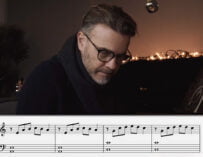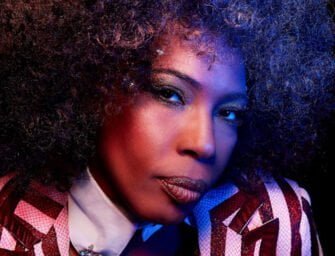
Gary Barlow on BBC Maestro: “Songwriting is the art of turning the music in your head into something that people will connect with”
Performing songwriter and regular Songwriting Magazine contributor Lisa Redford reports back on the Take That legend’s new 29-lesson online course
As an artist passionate about songwriting, I’m always fascinated by how others compose songs and refine their material. It’s intriguing to discover their writing process, techniques they use to find inspiration and to adopt any approaches I may not have considered. Having established himself as one of the UK’s most successful songwriters with 14 No 1 singles, as well as the recipient of six Ivor Novello Awards, Gary Barlow certainly has the credentials to share his songwriting skills and wealth of experience in the music business. His BBC Maestro songwriting course – designed to take you from the tune in your head to becoming a successful songwriter – provides 29 lessons with three-and-a-half hours of quality video content. There are also accompanying comprehensive course notes to download which include summaries of the lessons and exercises, key takeaways, plus further inspiration and insights from the Take That legend.
“The language of music is a good one to learn”
From the start, it’s apparent how passionate Gary is about songwriting and “translating your heart”. Music is everything to him and this shines through throughout the course. He reflects on the fact that, when he was 15 years old, he longed for someone to inspire him; who could provide any clues to the “elusive butterfly of writing songs”. His obsession for music started young: being from a music-loving household, growing up on pop, playing keyboards at the age of 10, buying singles from his local record shop and getting his first keyboard for Christmas, which changed the course of his life and where he “found his passion”. After discovering this, he has loved working hard, stressing the importance of having a strong work ethic and the discipline and self-commitment it requires to pursue a music career. Gary is open and honest throughout – referring to his dark and empty 10 years out of the limelight – which makes him relatable despite his incredible success.
“A beautiful thing to sit and play for yourself”
Each lesson explores different aspects of songwriting and techniques to spark inspiration and compose songs, as well as sections on how to navigate and sustain a career in the music business. These include: pushing your creativity, having longevity, reaching an audience, finding your own voice, inspiration, the beauty of simplicity, writer’s block, confidence, practice and the joy of learning an instrument – “one of the best things you can do to harness your musical journey”. A highly accomplished musician and producer able to read music, Gary also shares his experience of working for a different discipline in his writing for the theatre, singing – particularly the thrill of performing your own song – as well as the more musical elements of constructing a song: the chorus, experimenting with chords and major to minor, with Gary providing revealing and illuminating insights and advice during each of the lessons.
“Songs are born from the craziest of places”
In Lesson 2 ‘What is Songwriting?’, it’s refreshing that Gary doesn’t try to simplify and define songwriting because writers know what a difficult – but often magical and mysterious process – it can be. He’s honest about how frustrating it is to make “a musical version of what’s going on inside” and that “no two days are ever the same” – however, that’s what makes it exciting and this certainly resonates. He gives us no illusions about songwriting being easy and has realistic advice; believing there’s a process – layers of exploration and asking questions. Gary also shares how he sets rules for himself – having a stopwatch to create for an hour – as well as how he logs and edits his ideas. In another insightful lesson, Creativity, he talks about “a very special thing” – knowing when a song is finished, while also highlighting the importance of all aspects: the melody, lyrics, chords, arrangement and performance.
“Have an appreciation for other music”
Lesson 4 ‘Listening’ is also interesting; Gary sharing how important it is to train your ears and to “be an expert in that taste of yours “ as well as really listening and appreciating music outside your own style. This is key for him to be inspired: “appreciation leads to inspiration” and it resonates for me. When I’m also needing to find that spark of inspiration, listening to other music and also learning how others write and record, draws me to incorporate other influences in my writing. For Gary, growing up on classic mainstream pop inspired by the likes of Billy Joel and Elton John, he’s always known his musical identity, but also acknowledges that some of his biggest songs were because he was open to going down another route.

Gary Barlow on BBC Maestro: “I always think of my songs as a diary of my life”
I’m always fascinated to hear the stories of how well-known songs were written and I particularly enjoyed hearing the inspiration behind some of Gary’s biggest hits throughout the course. He deconstructs songs and reveals their origins, while also making it relevant advice for introducing into your own songwriting: A Million Love Songs – written when Gary was only 15 – involved chasing a musical break and having another hook in the song; Pray’s production was inspired by new jack swing with the song combining both major and minor chords. In Lesson 11 ‘No Idea Is Ever Wasted’, Gary recollects how after writing Open Road at 17, the song couldn’t find the “missing touch”. However, after Take That split up, the song and its sound finally made sense. This illustrates the importance of keeping your ideas somewhere safe for when it’s right and I’ve definitely found that with my own material. Gary often imparts the message of being brave with your writing. In ‘Pushing Your Creativity’, he demonstrates how in Back for Good he tried something new – sang in falsetto and worked hard on the melody and its musical range while having a simple backdrop of chords – a brave thing to do at the time. He also kept adding hooks and sections to “make this sentiment and this song the best it can be.”
“We’re there to inspire and be inspired”
I especially enjoyed Lesson 15 on ‘Collaboration’ and Gary’s memories of writing Patience with American guitarist John Shanks. Gary had one lyric representing the 10 years off from Take That but rather than putting it within the chorus, the title went into the verse. The song also highlights how rewarding it is to go somewhere new and to co-write. With his pop sensibility and gift for melodies, Gary knows the importance of hooks to draw the listener in and details experimenting with chords – the “crucial building blocks” – and how they have dictated the emotions and sentiments of many of his songs. In Lesson 14, he shares how Greatest Day introduces the chorus after two lines, providing that “golden moment” and has become a show opener, belonging firmly at the top of the setlist.
“Tools don’t write a song – they give us the process”
Lessons 17-22 on ‘Constructing A Song’ is the part of the course I enjoyed most. Through six detailed lessons, Gary takes us through the practical process of writing a brand new song from scratch. Using his keyboard and laptop, he begins with an idea: how do I feel today? Coming up with “Now I’ve decided…” for a lyric, he discusses the various decision points faced as the new song develops, experimenting with choice of key, style, feel, tempo and sentiment. Gary scats lyrics while creating a rhythm on his laptop and also breaks down sections of the song; how a verse is that first message and conversation starter, for the chorus it’s important when working on sections to return to the start and sing it back through. He scats the melody, singing an alternative version, and shows how doing this can result in some exciting new melodies and ideas. Gary also talks about how strings and other instrumentation can enhance chords; it was really exciting to witness a brand new song taking shape.
This whole section is full of great advice: the importance of staying in the moment to maintain your flow, stripping back the melody, how good it is when your song asks for more, not just settling on where you started, being your own personal editor, expanding and adding syllables to melody, driving the hook home and fine-tuning lyrics. As the ideas flow and he sings and plays, Gary conveys genuine excitement and how much fun the writing process can be. These six lessons made me genuinely inspired to write and it felt like being present during an actual writing session with Gary at his studio.
“One day soon, this will all be someone else’s dream”
The course concludes with Gary talking about Never Forget – an emotional song he “needed to write” and how for someone driven melodically, he wrote its lyrics first – revealing how the writing process can change. With all his experience of songwriting, Gary’s enthusiasm is infectious as he shares a fundamental message of “enjoy your passion” – that’s what will make you work at your writing on a daily basis. I would recommend the course for those venturing into songwriting for the first time, as well as those who are already writing and want to explore new approaches and be inspired. Gary is an engaging, candid and natural communicator as he imparts his skills, encouragement and advice during this brilliantly constructed and comprehensive course where you can revisit the lessons as often as you like. I’m now going to try some of the exercises in the accompanying course notes PDF to continue this magical and elusive journey of songwriting.
Words: Lisa Redford




































Related Articles